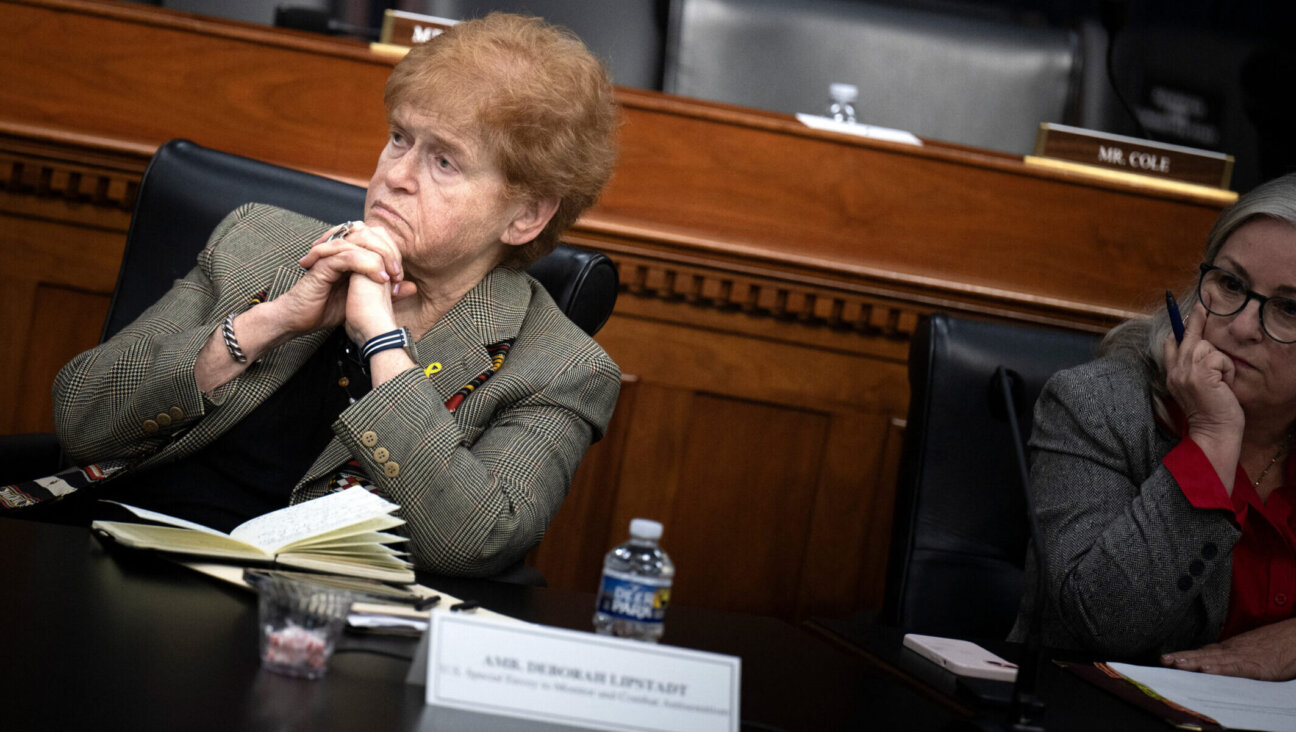Washington Anger At Israel Grows As Outposts Stay
WASHINGTON — Distrust and anger in the Bush administration is growing over the refusal of Prime Minister Sharon to dismantle illegal outposts in the West Bank.
Administration officials recently told pro-Israel activists in Washington that Sharon’s failure to dismantle these mini-settlements — some of them uninhabited and all of them erected without Israeli government approval — is fostering mistrust in the White House and hurting personal relations between President Bush and the Israeli leader.
One pro-Israel activist went so far as to warn that Sharon’s inaction on illegal settlements could lead the Bush administration to limit its support for Israel if the International Court of Justice in the Hague takes up the issue of the West Bank security fence. The U.N. General Assembly approved a non-binding resolution Monday asking the court to consider the “legal consequences arising from the construction of the wall being built by Israel, the occupying power.”
“This outpost issue is a big problem for Israel. The administration is talking about it as a manifestation of bad will,” said one pro-Israel activist with close ties to Mideast policy makers. “Because of such issues, the administration is developing an attitude toward Sharon of judging him by his actions, not by his words.”
The growing mistrust toward Sharon, observers said, helps explain why administration officials are reacting skeptically to proposals made by the Israeli leader and his deputy prime minister, Ehud Olmert, to unilaterally impose a “separation” plan in the West Bank if the Palestinians do not fulfill their part of the “road map” peace plan.
Administration officials and policy experts have been playing a guessing game over Sharon’s intentions since the launching of the road map. Some officials in the administration think that the war-weary former general is genuinely seeking to strike a bold peace deal and is willing to make the necessary concessions to the Palestinians. Others, however, accuse the Israeli prime minister of simply going through the diplomatic motions of the road map in order not to damage his relations with Washington, while taking unilateral actions to thwart the plan. Advocates of both views point to Sharon’s vague promises to support their views, as they anxiously wait for him, in the words of one pro-Israel activist “to clarify his intentions, by actions more than by words.”
Sharon on Tuesday told the Knesset security and foreign affairs committee that he was preparing to unveil a plan for unilateral measures to be taken in case the Palestinian Authority does not implement its obligations under the road map. Sharon reportedly characterized his plan as being “complex, difficult and controversial,” and added that the plan may involve “relocating settlements.” He did not elaborate.
American and Israeli diplomatic sources confirmed that in his visit to Israel earlier this month, Assistant Secretary of State for Near Eastern Affairs William Burns urged his Israeli interlocutors to take immediate and decisive action against the outposts.
Jewish settlers in the West Bank have erected more than 60 illegal outposts since Sharon took office in March of 2001. His government says it dismantled eight outposts, but five of them were reportedly rebuilt, according to Israel’s Peace Now movement, which monitors settlement activity in the territories. Recently, Sharon government officials have been publicly discussing plans to approve some of those outposts and grant them legal status, causing further frustration in Washington. Under the terms of the road map, Israel is obliged to freeze settlement activity in general and dismantle all illegal outposts in the West Bank.
One pro-Israel activist said that he was told by a White House official: “Bush received a personal promise from Sharon to immediately dismantle the outposts, and Sharon has not done that.”
The president has reportedly expressed dismay to his foreign policy aides over what he views as Sharon’s failure to keep a personal promise that the Israeli leader made to Bush more than seven months ago. The promise was made at the summit in Aqaba, Jordan, in May, when Bush met with Sharon and then-Palestinian Prime Minister Mahmoud Abbas.
According to the Bush administration’s view, the outposts ought to be dismantled regardless of the progress in implementing the “road map” peace plan. Israeli diplomats say that Israel is not carrying out its share of road-map commitments because the Palestinians have not executed their share of the deal. But, a source said that American officials believe “the outposts are not a purely diplomatic issue but a matter of enforcing Israel’s own law.”
“Bush puts a premium on personal relationships with world leaders,” said a pro-Israel activist, speaking on condition of anonymity. “If you cross the line with him, you’re out of favor.”
Diplomats and pundits in Washington speculated last week that Secretary of State Colin Powell’s decision to meet December 5 with authors of the unofficial peace initiative known as the Geneva Understanding was in part intended to send a message of discontent to Sharon. Whether that was the intention or not, Sharon and his aides did interpret the meeting as a rebuke.
Powell is set to meet December 12 with the authors of another freelance peace agreement, former Israeli security service chief Ami Ayalon and Palestinian professor Sari Nusseibeh. The pair is conducting petition drives among Israelis and Palestinians in support of a two-state solution similar to the one outlined in the Geneva deal.
The Forward is free to read, but it isn’t free to produce

I hope you appreciated this article. Before you go, I’d like to ask you to please support the Forward.
Now more than ever, American Jews need independent news they can trust, with reporting driven by truth, not ideology. We serve you, not any ideological agenda.
At a time when other newsrooms are closing or cutting back, the Forward has removed its paywall and invested additional resources to report on the ground from Israel and around the U.S. on the impact of the war, rising antisemitism and polarized discourse.
This is a great time to support independent Jewish journalism you rely on. Make a gift today!
— Rachel Fishman Feddersen, Publisher and CEO
Support our mission to tell the Jewish story fully and fairly.
Most Popular
- 1

Opinion The dangerous Nazi legend behind Trump’s ruthless grab for power
- 2

Opinion A Holocaust perpetrator was just celebrated on US soil. I think I know why no one objected.
- 3

Culture Did this Jewish literary titan have the right idea about Harry Potter and J.K. Rowling after all?
- 4

Opinion I first met Netanyahu in 1988. Here’s how he became the most destructive leader in Israel’s history.
In Case You Missed It
-

Culture Trump wants to honor Hannah Arendt in a ‘Garden of American Heroes.’ Is this a joke?
-

Opinion Gaza and Trump have left the Jewish community at war with itself — and me with a bad case of alienation
-

Fast Forward Trump administration restores student visas, but impact on pro-Palestinian protesters is unclear
-

Fast Forward Deborah Lipstadt says Trump’s campus antisemitism crackdown has ‘gone way too far’
-
Shop the Forward Store
100% of profits support our journalism
Republish This Story
Please read before republishing
We’re happy to make this story available to republish for free, unless it originated with JTA, Haaretz or another publication (as indicated on the article) and as long as you follow our guidelines.
You must comply with the following:
- Credit the Forward
- Retain our pixel
- Preserve our canonical link in Google search
- Add a noindex tag in Google search
See our full guidelines for more information, and this guide for detail about canonical URLs.
To republish, copy the HTML by clicking on the yellow button to the right; it includes our tracking pixel, all paragraph styles and hyperlinks, the author byline and credit to the Forward. It does not include images; to avoid copyright violations, you must add them manually, following our guidelines. Please email us at [email protected], subject line “republish,” with any questions or to let us know what stories you’re picking up.















